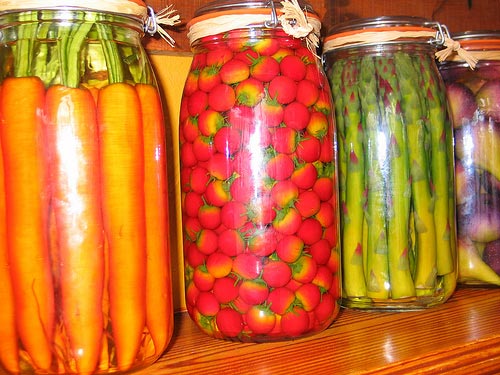Ariz.-based Eurofresh Farms has, according to The Packer, developed a new food safety system, EnviroLock, that requires workers, and anyone entering produce-producing greenhouses, to pass through a sanitation facility before entering, wash  and disinfect their hands and forearms, and don color-coded hospital-style scrubs, shoes, hairnets and gloves through the duration of their shift of stay.
and disinfect their hands and forearms, and don color-coded hospital-style scrubs, shoes, hairnets and gloves through the duration of their shift of stay.
That’s because anything that comes into contact with fresh produce has the potential to contaminate, is difficult to wash off, and outbreaks of foodborne illness are disastrous.
In Chicago, the Public School gardens are full of chubby tomatoes, heavy squash and fragrant basil but none of the produce ever finds its way into CPS lunchrooms. Instead, because of rules set by the district and its meal provider, the food is sold or given away.
The Chicago Tribune reports that the policies are in place despite the high obesity rate among Illinois children and experts’ concerns that young people are eating few fresh vegetables.
And that’s the problem with these stories, playing safety off against local and little kids.
Why not teach kids about food safety; instead of complaining that local is magically immune to microorganisms, embrace and market the food safety  advantages of local markets – but only if it can be backed up with data.
advantages of local markets – but only if it can be backed up with data.
Put the rhetoric aside and combine microbiologically safe with local – that means answering the same questions the big, controlled access greenhouses have to answer to sell their produce to Walmart and Costco and others: know and test the source of irrigation water, pay attention to the quality of soil amendments, let kids know the importance of handwashing and how dangerous bugs move around.
Big or small, be the bug, and be safe.

 disease before taking corrective action.
disease before taking corrective action.
 something with stamps or coins before food safety – practices food law in Ottawa (that’s in Canada) and shares his thoughts in a monthly column for Food in Canada.
something with stamps or coins before food safety – practices food law in Ottawa (that’s in Canada) and shares his thoughts in a monthly column for Food in Canada. once a primary task of food stylists and photographers, the new challenge is making messy food look appetizing.
once a primary task of food stylists and photographers, the new challenge is making messy food look appetizing. the date on the packaging has passed.
the date on the packaging has passed.(1).jpg) would anyone pay for stuff that could be made at home for nothing when parental-types bought the food.
would anyone pay for stuff that could be made at home for nothing when parental-types bought the food..jpg) was closed by the Southern Nevada Health District.
was closed by the Southern Nevada Health District. sure this does not happen again."
sure this does not happen again.".jpg) characterizations. These changes were often the result of efforts to revive interest in a show whose audience had begun to decline, usually through the employment of different actors, writers or producers.
characterizations. These changes were often the result of efforts to revive interest in a show whose audience had begun to decline, usually through the employment of different actors, writers or producers. 29 of the 80 meat products assessed were produced by unlicensed operators, adding,
29 of the 80 meat products assessed were produced by unlicensed operators, adding, food-wise.
food-wise.